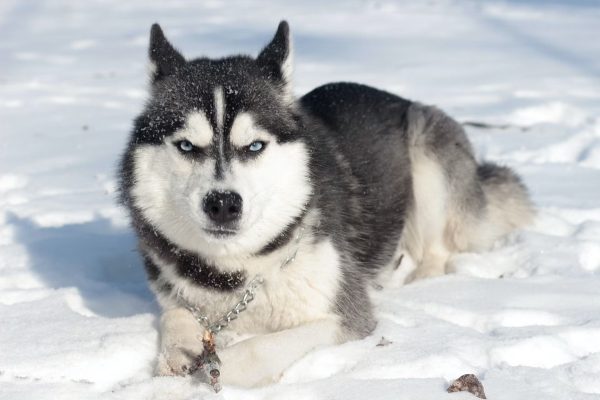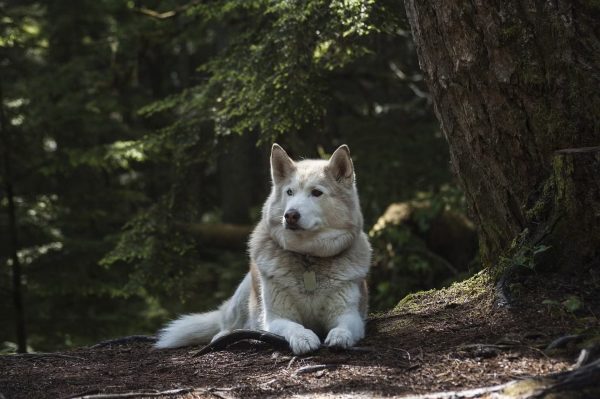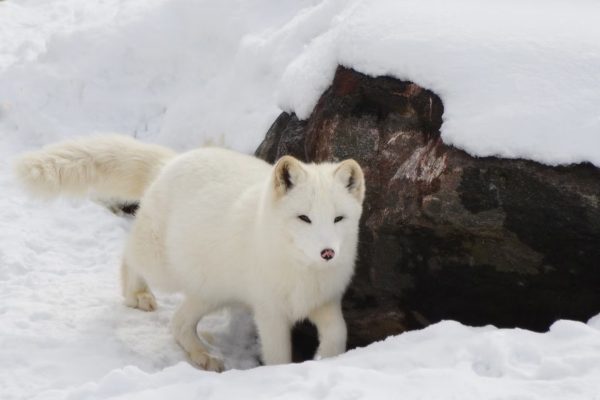This post is also available in:
Français (French)
Español (Spanish)
They are majestic, yet mysterious animals that captivate us with their beauty and grace. As wolf dogs become increasingly popular as pets, it is important to understand the complexities involved in owning one.Wolf Dogs have been a source of fascination for centuries.
With this article I will provide an overview of wolf dog traits and characteristics, discuss the challenges associated with ownership, and offer advice on how best to care for these wonderful creatures.
Wolf Dogs can be intelligent and loving companions when properly cared for and socialized from a young age. However, due to their wild ancestry they require special attention and understanding from their owners. To ensure your wolf dog has a happy and healthy life you must take into account its unique needs such as diet, exercise routines, appropriate living environment, and mental stimulation.
This article provides all the information necessary to make sure you give your pet what it needs most: love!
Wolf Dog Traits And Characteristics
The wolf dog, or wolf hybrid as it is sometimes known, is an incredibly fascinating animal. Despite its wild ancestry, this canid has a great capacity for affection and loyalty towards its owners and those that share their home. They are highly intelligent animals with complex socialization needs, which require attentive owners who understand the breeders’ advice to ensure these beautiful creatures get all they need in life.
When considering owning one of these majestic beasts, there are several important considerations to take into account.
Firstly, due to their strong genetic ties to wolves – particularly grey wolves – they tend to have much higher energy levels than most domestic dogs. This means that you must be prepared to provide them with plenty of mental stimulation and physical exercise on a daily basis if they are going to stay contented and healthy.
Additionally, as mentioned above: socialization plays a major role in your pet’s development. As pups, Wolf Dogs should be exposed gradually and carefully – both mentally and physically – to various people, places, environments, sounds etc., in order for them to become well-rounded adults that can handle different situations confidently without fear or aggression.
Sadly, many owners do not realize how important early intervention is until it is too late; so please bear this in mind before taking the plunge!
Finally (and perhaps most importantly), it is crucial that you commit yourself fully when raising one of these remarkable animals – after all: every decision you make will ultimately shape their future behaviour and determine whether or not they remain happy and balanced throughout their lives.
Therefore please remember that patience and perseverance go a long way when caring for any canine companion – especially those descended from such noble ancestors!
Challenges Of Wolf Dog Ownership
John and Jane Doe, a typical family from Anytown USA, recently adopted a wolf dog to add to their household. With the addition of this new pet came a unique set of challenges that they had never faced with other pets before.
Wolf dogs require special care in order to ensure proper health and wellbeing; here are three key points to consider if you’re considering getting your own wolf dog:
- Spaying/neutering is highly recommended for all domestic animals, including wolf dogs – not only does it decrease the chance of behavioral issues but it also reduces the risk of certain diseases common among unaltered animals.
- Wolf dogs have higher exercise needs than traditional breeds as well as specific dietary requirements due to their increased metabolism and activity level.
- Behavioral issues can be common in wolf dogs without proper training or socialization, so owners should make sure they provide plenty of enrichment activities and positive reinforcement techniques when working with their canine companion.
It’s important to remember that while owning a wolf dog comes with its own rewards, there will likely be more day-to-day challenges than if one were to get an average house pet like a Labrador retriever or Chihuahua. To ensure success in rearing these majestic creatures, potential owners must do their research beforehand and commit themselves fully once they bring home their furry friend!
Diet And Exercise Requirements
Wolf dogs are incredibly unique and complex creatures, requiring expert care when it comes to their diet and exercise needs. They require a well-rounded approach to nutrition, with plenty of protein as well as carbohydrates, fats, and vitamins in order to maintain optimal health.
Additionally, these animals have very specific socializing needs that should be met through regular interaction with humans or other wolf dogs whenever possible. Bonding cues such as eye contact, body language and vocalizations can help build trust between the animal and its human companion over time.
Exercise is also an essential part of any wolf dog’s life; they need physical activity every day in order to stay healthy both physically and mentally. Long walks on leash or off-leash playtime with other canine friends are great ways for them to get the exercise they need while spending quality time bonding with you.
Understanding your pet’s personality will help you determine which type of exercises would be most beneficial for them. In addition to providing daily physical activity, mental enrichment games and puzzles can provide additional stimulation for your pup’s brainpower! This could include problem solving toys where treats must be worked out from within a toy housing or simply teaching them new tricks like “sit” or “down”.
Ultimately, providing adequate nutrition and exercise will go a long way towards keeping your wolf dog healthy and content throughout its lifetime! Finding the perfect balance of physical activity with restful periods is key to ensuring optimum wellbeing for this special breed of pet – after all, if we want our furry companions around us for years to come then we must take good care of them now!
Providing The Appropriate Living Environment
Providing the Appropriate Living Environment for a Wolf Dog is key to ensuring that they have a healthy and happy life. It’s important to consider both their physical needs, such as shelter and exercise, as well as their socializing needs, like interaction with humans or other animals of similar size.
When it comes to legal regulations regarding wolf dogs, these vary from state to state; however, most require some form of registration or permit due to their wild animal nature.
It’s essential for owners to provide them with plenty of exercise in the form of daily walks or runs on a leash. Keeping up with regular vet appointments is also vital so that any medical issues can be detected early on. Additionally, providing space for them to run around freely in an enclosed area – like a fenced-in yard – allows them the opportunity to express natural behaviors without endangering themselves or others.
Socialization is just as important for wolf dogs as it is for domestic breeds. Introducing them slowly and carefully into situations where there may be strangers or other animals present will help build trust and foster positive interactions between them and their environment. Providing toys that challenge their cognitive abilities while playing can also enhance brain development by stimulating problem solving skills. Regularly teaching new commands helps keep them engaged mentally and physically while reinforcing obedience training basics.
Creating a comfortable home environment requires patience and dedication but ultimately leads to having a more fulfilling relationship with your pet companion. Knowing what kind of care they need along with understanding legal requirements specific to your region are all part of being an informed owner. Through this knowledge you can make sure that your wolf dog has everything necessary for leading a long and enjoyable life!
Mental Stimulation And Training
Wolf dogs are a unique breed that requires extra care and attention. They have special socialization needs, which can be challenging for some owners to meet.
Mental enrichment is key in providing the best quality of life for these animals, as it helps them stay mentally stimulated and healthy. This can be achieved through interactive training sessions that involve positive reinforcement methods such as clicker techniques or reward-based systems.
It’s important to remember that wolf dogs need consistent training with clear guidelines and expectations set by their owners. Positive reinforcement will encourage good behaviors while discouraging bad ones; this builds trust between pet and owner and promotes overall well-being.
It also helps keep boredom at bay and prevents destructive behavior from developing due to lack of mental stimulation.
Physical exercise alone isn’t enough when caring for a wolf dog; they need physical activity but also something more rewarding than just running around outdoors. Incorporating brain games into their playtime provides intellectual challenges that help boost confidence levels, allowing your pup to explore new activities without feeling overwhelmed or anxious about trying something unfamiliar.
Puzzles, agility courses, nose work exercises – these are all great ways to get both mind and body working together!
It’s essential to provide adequate opportunities for mental stimulation throughout the day so that your wolf dog stays engaged in learning new skills while developing existing ones too. With regular practice, you’ll be able to build strong bonds with your canine companion based on mutual respect, trust and understanding – making every day an enjoyable experience for both of you!
Frequently Asked Questions
How Much Does It Cost To Buy A Wolf Dog?
Buying a wolf dog can be an exciting experience, but it’s important to remember that these unique animals need special care and attention.
Training tips, diet requirements, and general upkeep are factors to take into consideration before you make the purchase.
The cost of owning a wolf dog will vary depending on the breeder or rescue facility you go through as well as any additional fees associated with vaccinations or spaying/neutering your pet.
When making such an investment, it’s best to research reputable breeders and understand what type of commitment is necessary for proper care.
How Much Space Do I Need To Provide For A Wolf Dog?
When it comes to providing adequate space for your pet, wolf dogs have very specific needs. Exercise requirements and socialization needs must be taken into consideration when deciding the size of their living area.
Wolf dogs are very active animals and need a minimum amount of room in order to stay healthy and happy. A typical backyard is not enough; they require at least 1/2 acre or more of land that can provide them with plenty of exercise opportunities.
Additionally, these majestic creatures also like having companionship so if you don’t plan on giving them one-on-one attention then make sure they have other wolf dog friends around as well!
Are Wolf Dogs Suitable For Families With Children?
Wolf dogs, when properly socialized and trained, can make excellent family pets.
However, it’s important to consider the specific needs of these animals before making a commitment.
Wolf dogs require specialized training to ensure they are comfortable in their environment and interact positively with people, especially children.
Socialization requirements should also be taken into account; since wolf dogs are descended from wild animals, they may need more time and patience than other breeds to become fully integrated members of your family.
All in all, if you provide them with proper care and attention, wolf dogs can be an ideal pet for families with children!
How Often Do Wolf Dogs Need To Be Groomed?
Grooming a wolf dog can be as much of an art form as it is a science; in fact, one could say that the way you groom your pet often speaks volumes about its socialization and training challenges.
With this in mind, it’s important to know just how often you should be grooming your four-legged friend. After all, having shiny fur isn’t the only thing at stake here!
Generally speaking, experts recommend brushing or combing a wolf dog two to three times per week – depending on their coat length and type – to keep them looking their best while minimizing tangles and mats.
What Is The Average Lifespan Of A Wolf Dog?
The average lifespan of a wolf-dog, also known as a wolfdog or wolf hybrid, can vary widely depending on factors such as the percentage of wolf genetics, the specific breeds involved, and the individual animal’s care and environment. In general, wolf-dogs tend to have shorter lifespans compared to domestic dogs due to their unique genetic makeup and potential health challenges.



